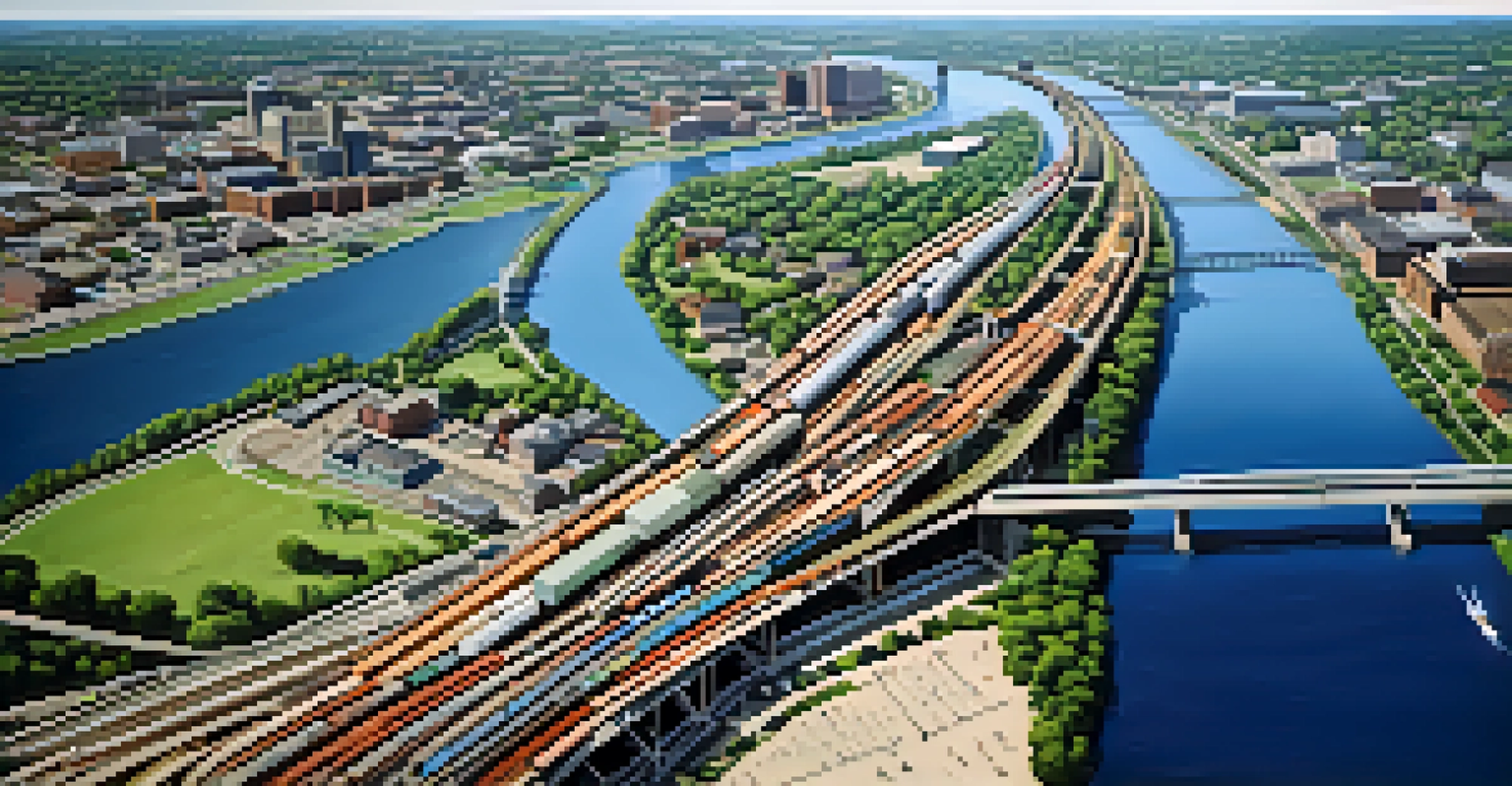Impact of the Mississippi River on Memphis Transportation

Historical Significance of the Mississippi River
The Mississippi River has long been a vital artery for transport and trade, especially for Memphis. Established in the 19th century, the river allowed for the easy movement of goods, connecting the South to the rest of the United States. This historical context highlights how Memphis became a significant hub for commerce, largely due to its strategic location along the river.
The Mississippi River is a vital artery that has shaped not just the economy but the culture of the cities it touches.
As steamboats and barges navigated the river, they facilitated the transport of cotton and other agricultural products, which were crucial to the city's economy. The bustling riverfront was once filled with warehouses and docks, showcasing the vibrancy of trade. This legacy continues to influence Memphis's transportation landscape today.
Moreover, the river's role in transportation paved the way for the development of railroads and highways, further enhancing Memphis's connectivity. The integration of these modes of transport allowed for a seamless flow of goods, making the city a commercial powerhouse in the region.
Current Transportation Networks and the River
Today, the Mississippi River remains a key component of Memphis's transportation network. The river provides a crucial route for barge traffic, which is economical for shipping large quantities of goods. This not only lowers transportation costs for businesses but also reduces road congestion in the area.

In addition to barge traffic, the river complements Memphis's extensive highway and rail systems. This multimodal approach allows businesses to choose the most efficient method of transport based on their needs. For instance, goods can be moved from barge to truck, enabling quick delivery to local markets.
Mississippi River: Trade Lifeline
The Mississippi River has historically served as a vital transport route for Memphis, significantly boosting its economy through trade.
Furthermore, the presence of the river supports tourism and recreational activities, which also contribute to the local economy. Riverboat cruises and fishing charters attract visitors, adding another layer to Memphis's transportation ecosystem.
Economic Impact of River Transport on Memphis
The economic implications of the Mississippi River on Memphis transportation are profound. The river supports thousands of jobs in shipping, logistics, and related sectors. As a result, the local economy benefits from increased trade activity and business opportunities.
Rivers are the arteries of our planet, and they must be cared for to sustain our communities and economies.
Additionally, the river's ability to handle bulk cargo means that businesses can save significantly on transportation costs. This economic efficiency enables companies to invest more in their operations, leading to growth and job creation. The ripple effect of these savings can be seen throughout the local economy.
Moreover, the ongoing development of infrastructure along the river enhances its importance as a transportation hub. Upgrades to docks and terminals ensure that Memphis remains competitive in attracting businesses that rely on river transport.
Environmental Considerations in River Transport
While the Mississippi River is crucial for transportation, it also presents environmental challenges. The increased barge traffic raises concerns about pollution and habitat disruption. It's essential for Memphis to balance economic growth with environmental sustainability.
Efforts are underway to mitigate the environmental impact of river transport. Initiatives such as adopting cleaner fuel technologies and implementing stricter regulations on waste disposal are being explored. These measures aim to preserve the river's health while maintaining its role in transportation.
Balancing Growth and Environment
While river transport fuels economic growth, it also poses environmental challenges that require sustainable practices.
Public awareness and community engagement are also vital in addressing these environmental issues. Local organizations and residents can play a crucial role in advocating for sustainable practices that protect the river and its ecosystem.
Future Trends in Memphis River Transportation
Looking ahead, the future of river transportation in Memphis is promising, with potential for innovative developments. Advances in technology, such as automated barges and enhanced navigation systems, could revolutionize how goods are transported along the Mississippi. These innovations may lead to increased efficiency and reduced operational costs.
Additionally, the growing emphasis on sustainable practices may influence the evolution of river transport. As businesses prioritize eco-friendly logistics, there could be a significant shift towards greener shipping methods, further enhancing the river's role in sustainable transportation.
Furthermore, collaboration between government agencies, businesses, and environmental groups will be essential for shaping the future of river transport. By working together, stakeholders can ensure that Memphis remains a vibrant transportation hub while also protecting the health of the Mississippi River.
Cultural Impact of the River on Memphis
The Mississippi River is not just a transportation route; it's also an integral part of Memphis's cultural identity. The river has inspired countless artists, musicians, and writers, contributing to the city's rich cultural tapestry. Its presence in music, particularly in blues and jazz, has shaped Memphis's reputation as a cultural capital.
Events like the Memphis in May International Festival celebrate the river's significance, drawing visitors from around the world. These festivities highlight the connection between the river and the local community, fostering a sense of pride and belonging. The river is not only a means of transport but also a source of inspiration and celebration.
Future Innovations in River Transport
Technological advancements and collaborative efforts are set to enhance the efficiency and sustainability of river transportation in Memphis.
Moreover, the riverfront serves as a gathering place for locals and tourists alike, featuring parks, recreational areas, and cultural events. This vibrant atmosphere enhances the city's appeal and encourages community engagement, further solidifying the river's role in Memphis's cultural landscape.
Challenges Facing Memphis River Transportation
Despite its many advantages, Memphis's river transportation system faces several challenges. Issues such as flooding, sediment buildup, and infrastructure maintenance require ongoing attention and resources. These challenges can disrupt shipping schedules and impact the economy, underscoring the need for effective management strategies.
Additionally, competition from other transportation modes, such as trucking and rail, poses a threat to the river's dominance. As companies seek faster and more reliable options, the importance of adapting the river transport system cannot be overstated. This calls for innovation and investment in infrastructure to stay competitive.

Addressing these challenges will require collaboration among various stakeholders, including government agencies, businesses, and environmental groups. By working together, they can develop comprehensive solutions that ensure the sustainability and efficiency of Memphis's river transportation system.